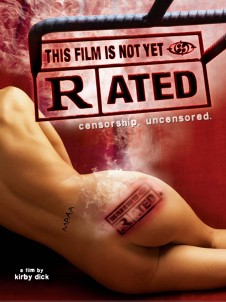
This Thursday, I’ll introduce director Kirby Dick and his movie “This Film is Not Yet Rated” at a free screening at USC. The screening is sponsored by the USC Free Culture club, a campus organization dedicated to promoting liberty, openness, and access to information.
Kirby Dick has graciously agreed to present the screening of his movie, which I reviewed in September. This Film is Not Yet Rated is the best documentary I’ve seen all year, the kind of thing that inspired outrage and sympathy. It tells the hidden story of the MPAA’s rating board, and its systematic discrimination against sympathetic portrayals of gay sexuality and sex in general, and its tacit support for ultra-violence.
The ratings board is shrouded in secrecy, and exists, supposedly, to forestall Congressional censorship of the film industry (an eventuality as unlikely as it is unconstitutional). The board’s membership is secret, as are the names of the appeals committee that is meant to watchdog the organizing. The whole, secretive mess was established by Jack Valenti in his capacity as head of the MPAA, and so it bends over backwards to help filmmakers from the major studios (while shafting indies).

Dick’s documentary revolves around his efforts to unmask the identity of the secret censor board. He hires a private eye and sets her to work (the CSI elements of the film are really juicy — it’s fun to see how private eyes really work). Threaded around this are interviews with filmmakers who’ve had run-ins with the board, and, as a climax, Dick’s own Orwellian adventures in submitting his documentary to the censor board whose identities he has uncovered.
I can’t wait to meet him — one viewing of This Film is Not Yet Rated turned me into an instant, lifelong fan. I hope to see you there!
Where: University of Southern California, Los Angeles: University Park Campus, George Lucas Instructional Building, 108
When: Thursday, November 30, 2006 : 7:00pm to 9:00pm

































